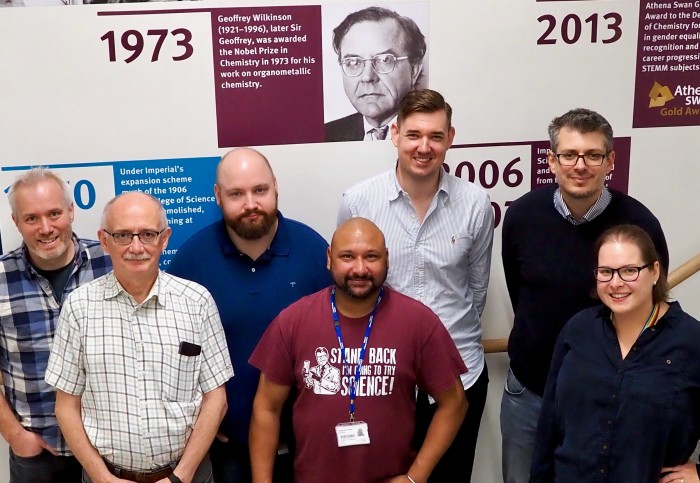Imperial education team wins prestigious Royal Society of Chemistry Prize

The Department of Chemistry's 'Lab-In-a-Box' team has been named winners of the Society's Prize for Excellence in Higher Education.
Nominated by their peers, the team was chosen by the RSC’s prestigious panel of judges as some of the most inspirational, innovative and dedicated people in education.
The team worked collaboratively to ensure that undergraduate students could continue to engage with hands-on practical chemistry learning while studying remotely.
"Through our lab-in-a-box project, it has been incredibly rewarding to see students being able to continue engaging with practical chemistry...[their] hard work and dedication to learning is a real credit to them."
After receiving the prize, the team said: “Working remotely during the pandemic lockdowns was undoubtedly one of the biggest challenges that university staff and students have had to face in recent times.
"Through our lab-in-a-box project, it has been incredibly rewarding to see students being able to continue engaging with practical chemistry and working hard to develop skills which they are now bringing back into their on-campus lab classes. Our students’ hard work and dedication to learning is a real credit to them.
“We are absolutely delighted and extremely proud to have been awarded the RSC Prize for Excellence in Higher Education for our work in supporting our students’ practical education through the COVID-19 pandemic. It is particularly rewarding to have been recognised for a truly group effort that would not have been possible without the hard work, skills, enthusiasm and dedication of the whole team.”

Creativity during the pandemic
The Department of Chemistry's Lab-In-a-Box team worked tirelessly during COVID restrictions to ensure that the university’s undergraduate students studying remotely could continue to engage with practical chemistry and develop their experimental and analytical skills. The team brought together people from across the department to develop bespoke learning approaches, resources and instruments, build large quantities of custom equipment and ensure smooth logistics while delivering experimental kits across the world.
Team member, Dr Luke Delmas, said: "Imperial College has a long tradition of providing our students a high level of laboratory experience, designed to develop the practical, analytical and theoretical skills required to work in the sector. We are inspired by the students themselves, who arrive with a contagious enthusiasm for laboratory classes that grows during their time at the College.
"We enjoy countless ‘lightbulb’ moments during our time spent in the lab, teaching the students not just how to do the practical things that chemists do, but how to think and problem-solve like a scientist. During lockdown, we saw one of our top priorities as being able to deliver at-home labs in a way that gave as authentic an experience as possible, where those inspiring moments and conversations could still happen."

The design of experiment kits centred on three key ideas: Allowing students to gain interactive experiences in chemistry. Creating an engaging learning environment that allows students to collaborate and feel part of the department while working remotely. Ensuring remote activities were aligned with our on-campus practical experience to enable a smooth transition back to in person learning.
Professor Oscar Ces, Head of the Department of Chemistry, said: “It's wonderful to see the hard work of our staff and their innovation rewarded with this prestigious award. The Lab-in-a-Box platforms they developed played a pivotal role in enhancing the educational experience of our students during Covid-19 and has underpinned a new generation of experiments for the future.”
The Society's praise
Gill Reid, President of the Royal Society of Chemistry, said: “For many of us as chemists our teachers were our inspiration – their influence in driving the next generation of amazing scientists cannot be underestimated. That’s why I’m so proud of the winners of the Education Horizon Prizes, each of whom demonstrates an infectious passion for learning that sparks young minds to do amazing things.
“This year’s winners set exemplary examples of the impact this can make; it’s no exaggeration to say their successes will be felt for generations to come ”
The Excellence in Education Prizes celebrate inspirational, innovative, and dedicated people working in primary, secondary, further education and higher education – including teachers, technicians and more. These prizes recognise a wide range of skills – from curriculum design to effective teaching, and from personal development to working culture. This category includes specific prizes for teams and for those in the early stages of their career.

The Royal Society of Chemistry’s prizes have recognised excellence in the chemical sciences for more than 150 years. In 2019, the organisation announced the biggest overhaul of this portfolio in its history, designed to better reflect modern scientific work and culture.
Dr Helen Pain, Chief Executive of the Royal Society of Chemistry, said: “It’s of vital importance that we recognise the crucial role that educators play in the advancement of the sciences. And that we commend their ability to inspire and nurture the next generation of bright young minds, so that they can go on to make new discoveries and innovations.
“Society faces many challenges, and educators give us the tools we need to advance our understanding of the world around us and solve many of the problems we encounter. The team’s work demonstrates an outstanding commitment to chemistry education, and it is our honour to celebrate their considerable contribution.”
Find out more
Team members included: Dr Nick Brooks, Dr Luke Delmas, Dr Joshua Edel, Dr Aleksandar Ivanov, DeeJay Kistnah, Dr Laura Patel, Dr Jakub Radzikowski, Simon Turner, and Elina Zalite.
Article text (excluding photos or graphics) © Imperial College London.
Photos and graphics subject to third party copyright used with permission or © Imperial College London.
Reporter
Murray MacKay
Communications Division